
Important new research about postcards to voters, with evidence they can backfire & *reduce* turnout among recipients. I hope national groups that have used postcards as a central part of their volunteer (& donor) recruitment read this & take it seriously
https://twitter.com/journalEPOP/status/1412064780349853705
The authors suggest the postcards' focus on a down ballot race may have "distracted" recipients, causing them to ignore other sources of info about more important congressional races also on that (2018) ballot for which they otherwise would have showed up to vote.
Hmm... maybe?

Hmm... maybe?


I'm more inclined to see these results as potentially in line w/fact that feeling like you "don't know enough" is one reason people choose not to vote/get involved.A postcard pitch can remind me how much I don't know, & who shd I trust, & where even start? prri.org/research/ameri… 



A quick read thru the hashtag #PostcardsToVoters will show goodhearted souls currently pouring time & energy into this technique, seeing it as a way to effect political change. Longtime followers will know this is a topic on which I have *thoughts*
https://twitter.com/lara_putnam/status/1329755733651501057
... which eventually became this piece, advocating for intentional & relational thinking by grassroots groups & volunteers, both when choosing strategic goals & when choosing tactics forgeorganizing.org/article/postca…
If volunteers are just executing a one-way, one-off outreach strategy from on high, it really is just the gigification of campaign labor. In contrast, knocking on doors volunteers *learn* from the interaction: & then there's an election & they learn even more from local results 

Most research on campaign effects looks at impact 1) on votes cast 2) in that election. Understandably! but local political life isn't a controlled study, or a 1-round game. that's why research asking broader questions👇about routes of impact is so welcome
https://twitter.com/dbroockman/status/1405984946733338630
• • •
Missing some Tweet in this thread? You can try to
force a refresh









